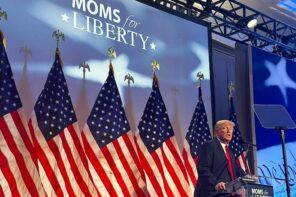Will amateur historian and WallBuilders founder David Barton be historical adviser to the next President of the United States of America? That’s the prospect raised by a new New York Times profile of Barton, who is an aggressive proponent of the thesis that the Christian dimensions of America’s founding have been suppressed.
(Julie Ingersoll analyzes Barton’s recent appearances on The Daily Show and in the New York Times in a must-read essay here at RD.)
I don’t fault Barton for his religious zeal, or his love of American history, and I admire the way he’s channelled public hunger for history into a profitable homegrown enterprise. But his brand of historical scholarship is bad medicine for American memory and American politics.
Even scholars friendly to Barton’s perspective denounce his work in clear and certain terms. As Derek Davis, director of church-state studies at Baylor University (a Baptist institution), said: “The problem with David Barton is that there’s a lot of truth in what he says. But the end product is a lot of distortions, half-truths, and twisted history.” Paul Harvey, a leading American religious historian, calls Barton’s brand of history “ideological entrepreneurialism.”
Ask any professional historian what’s wrong with David Barton, and they won’t say that it’s his religion or his religious enthusiasm for the American founders. It’s not even his credentials, really. (Barton has a degree in Christian eduction from Oral Roberts University.)
No, what makes David Barton dangerous is his total disrespect for the process of peer review: the driving force of contemporary scholarship. Forget what you’ve heard about political litmus tests for faculty in colleges and universities. If your data and hypotheses don’t pass muster with your peers, you’re toast. And as a working academic who has published in and conducted peer review for a top-ranked history journal, let me tell you that historians are among the most conservative and rigorous peer-reviewers I’ve encountered.
If David Barton is serious about history, he needs to demonstrate his respect for the time-tested process of peer review, the same way anyone who seeks to publish medical research would submit their findings to the review of their peers. He needs to listen to and acknowledge the hard-wrought findings of those who have devoted their lives to implementing and promulgating the best practices of historical scholarship. And he needs to open his own research to their rigorous review.
Refusing honest and open dialogue about the facts of our nation’s founding is not only bad medicine for scholarship; it’s bad medicine for democracy.
If Barton is as solid a scholar as he presents himself to be, why would he hide from peer review?




